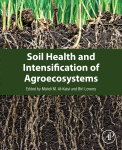

Most ebook files are in PDF format, so you can easily read them using various software such as Foxit Reader or directly on the Google Chrome browser.
Some ebook files are released by publishers in other formats such as .awz, .mobi, .epub, .fb2, etc. You may need to install specific software to read these formats on mobile/PC, such as Calibre.
Please read the tutorial at this link: https://ebookbell.com/faq
We offer FREE conversion to the popular formats you request; however, this may take some time. Therefore, right after payment, please email us, and we will try to provide the service as quickly as possible.
For some exceptional file formats or broken links (if any), please refrain from opening any disputes. Instead, email us first, and we will try to assist within a maximum of 6 hours.
EbookBell Team

4.1
30 reviewsSoil Health and Intensification of Agroecosystems examines the climate, environmental, and human effects on agroecosystems and how the existing paradigms must be revised in order to establish sustainable production. The increased demand for food and fuel exerts tremendous stress on all aspects of natural resources and the environment to satisfy an ever increasing world population, which includes the use of agriculture products for energy and other uses in addition to human and animal food.
The book presents options for ecological systems that mimic the natural diversity of the ecosystem and can have significant effect as the world faces a rapidly changing and volatile climate. The book explores the introduction of sustainable agroecosystems that promote biodiversity, sustain soil health, and enhance food production as ways to help mitigate some of these adverse effects.
New agroecosystems will help define a resilient system that can potentially absorb some of the extreme shifts in climate. Changing the existing cropping system paradigm to utilize natural system attributes by promoting biodiversity within production agricultural systems, such as the integration of polycultures, will also enhance ecological resiliency and will likely increase carbon sequestration.